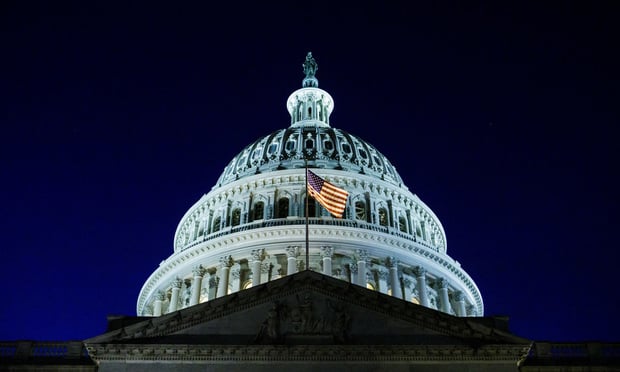Biased Senators Should Be Disqualified From the Impeachment Trial
Because some senators have made no secret of their refusal to be impartial, the House managers prosecuting the case against the president should move for them to be disqualified from sitting in judgment.
December 20, 2019 at 01:45 PM
5 minute read
 The U.S. Capitol building in Washington, D.C., on, Dec. 12, 2019.
The U.S. Capitol building in Washington, D.C., on, Dec. 12, 2019.
Under the Constitution, the impending impeachment trial of President Donald Trump must be decided by senators who are, and who have sworn to be, impartial. Because some senators, such as South Carolina Sen. Lindsey Graham, have made no secret of their refusal to be impartial, the House managers prosecuting the case against the president should move for them to be disqualified from sitting in judgment, and the chief justice, as the presiding officer, should grant that motion.
There are only three requirements in the Constitution for the conduct of impeachment trials. A two-thirds majority is needed for conviction, the chief justice of the United States presides when the president is on trial, and—most importantly—"when [the senators] are sitting for that purpose [of impeachment] they shall be on Oath or Affirmation." The oath is, of course, the requirement that the senators swear they will be impartial judges. The oath for senators, and also for the chief justice, is set forth in the Senate rules: "I solemnly swear (or affirm, as the case may be) that in all things appertaining to the trial of the impeachment of ——— ———, now pending, I will do impartial justice according to the Constitution and laws: So help me God."
Whether one considers the senators to be jurors or judges, the impartiality of decision-makers is crucial to our system of justice. The Sixth Amendment guarantees all those accused of crime "an impartial jury." As the Supreme Court has explained, "This is true, regardless of the heinousness of the crime charged, the apparent guilt of the offender or the station in life which he occupies." So, too, for judges, who Chief Justice John Roberts recently noted are charged with "maintaining the public's confidence in an impartial judiciary" and with "administer[ing] justice without respect to persons." Jurors and judges all take a solemn oath that they will render an unbiased judgment.
The Framers of the Constitution expected no less from the senators who were charged with judging cases of impeachment. In Federalist No. 66, Alexander Hamilton explained why the senators could be trusted to sit "in their judicial character as a court for the trial of impeachments." What other body, he wrote, could "preserve … the necessary impartiality between an INDIVIDUAL accused, and the REPRESENTATIVES OF THE PEOPLE, HIS ACCUSERS?"
Unfortunately, too many senators today seem ready to disregard the Constitutional requirement that they act as impartial decision-makers. Perhaps most notoriously, Graham has said, "I am trying to give a pretty clear signal I have made up my mind. I'm not trying to pretend to be a fair juror here." Meanwhile, Senate Majority Leader Mitchell McConnell affirms that his only interest is in working with the accused president to defeat the accusations. "I'm not impartial about this at all."
As is often noted, under the Constitution the Senate has the sole power of impeachment and can make up the rules. But the Senate cannot eliminate those few rules that are in the Constitution itself. The senators deciding the outcome of the impeachment trial must be "on Oath or Affirmation." They must swear that they will impartially decide the case, and they must diligently undertake to honor their oath. Of course, senators are politicians and are not immune to the public debate swirling around the impeachment inquiry. But that does not mean that they cannot render impartial justice on the evidence that is actually presented. The Supreme Court long ago recognized that, particularly in well-publicized cases, some jurors will have preconceived notions about guilt or innocence, but that does not mean that they cannot be impartial. Impartiality requires only that "the juror can lay aside his impression or opinion and render a verdict based on the evidence presented in court." It is surely not too much to ask our senators to undertake in good faith this same exercise, as the Constitution requires, and as jurors do every day.
It has sometimes been postulated that there is no mechanism to force the senators to take their oath seriously. Not so. As litigants do in selecting juries every day, the House managers can move to disqualify any senator who has prejudged this case and is unwilling to set those preconceptions aside and decide this case on the evidence. Justice Ruth Bader Ginsburg said just the other day that this standard practice should apply to the impeachment trial. "We have a process to select jurors. If a juror reveals a bias, they will be disqualified."
Who should decide the motion to disqualify any particular senator? The chief justice, of course, who the Constitution provides should preside over the trial. Much has been made of the Senate's ability to override decisions by the chief justice. In fact, the Senate rules for impeachment provide for overriding decisions by the chief justice only with respect to "questions of evidence." The motion to disqualify would rely on two provisions in the Constitution itself that the Senate cannot override: the requirement that the senators sit "on Oath or Affirmation" and the requirement that the chief justice preside. And if the senators attempt to override a ruling by the chief justice disqualifying a senator from sitting, and the chief justice acquiesces in that action, that sorry spectacle should play out in public, so that the people can judge for themselves the fairness of the proceedings.
The Framers expected that the Senate would take an impeachment trial seriously. Our citizens today deserve no less.
Gregory L. Diskant is a senior litigator at Patterson Belknap Webb & Tyler in New York and a member of the National Governing Board of Common Cause.
This content has been archived. It is available through our partners, LexisNexis® and Bloomberg Law.
To view this content, please continue to their sites.
Not a Lexis Subscriber?
Subscribe Now
Not a Bloomberg Law Subscriber?
Subscribe Now
NOT FOR REPRINT
© 2025 ALM Global, LLC, All Rights Reserved. Request academic re-use from www.copyright.com. All other uses, submit a request to [email protected]. For more information visit Asset & Logo Licensing.
You Might Like
View All
Restoring Antitrust: Returning to the Consumer Welfare Standard

New York Mayor Adams Attacks Fed Prosecutor's Independence, Appeals to Trump
5 minute read

The Marble Palace Blog: Supreme Court Books You Should Read in 2025
Law Firms Mentioned
Trending Stories
- 1Decision of the Day: Trial Court's Sidestep of 'Batson' Deprived Defendant of Challenge to Jury Discrimination
- 2Is Your Law Firm Growing Fast Enough? Scale, Consolidation and Competition
- 3Child Custody: The Dangers of 'Rules of Thumb'
- 4The Spectacle of Rudy Giuliani Returns to the SDNY
- 5Orrick Hires Longtime Weil Partner as New Head of Antitrust Litigation
Who Got The Work
J. Brugh Lower of Gibbons has entered an appearance for industrial equipment supplier Devco Corporation in a pending trademark infringement lawsuit. The suit, accusing the defendant of selling knock-off Graco products, was filed Dec. 18 in New Jersey District Court by Rivkin Radler on behalf of Graco Inc. and Graco Minnesota. The case, assigned to U.S. District Judge Zahid N. Quraishi, is 3:24-cv-11294, Graco Inc. et al v. Devco Corporation.
Who Got The Work
Rebecca Maller-Stein and Kent A. Yalowitz of Arnold & Porter Kaye Scholer have entered their appearances for Hanaco Venture Capital and its executives, Lior Prosor and David Frankel, in a pending securities lawsuit. The action, filed on Dec. 24 in New York Southern District Court by Zell, Aron & Co. on behalf of Goldeneye Advisors, accuses the defendants of negligently and fraudulently managing the plaintiff's $1 million investment. The case, assigned to U.S. District Judge Vernon S. Broderick, is 1:24-cv-09918, Goldeneye Advisors, LLC v. Hanaco Venture Capital, Ltd. et al.
Who Got The Work
Attorneys from A&O Shearman has stepped in as defense counsel for Toronto-Dominion Bank and other defendants in a pending securities class action. The suit, filed Dec. 11 in New York Southern District Court by Bleichmar Fonti & Auld, accuses the defendants of concealing the bank's 'pervasive' deficiencies in regards to its compliance with the Bank Secrecy Act and the quality of its anti-money laundering controls. The case, assigned to U.S. District Judge Arun Subramanian, is 1:24-cv-09445, Gonzalez v. The Toronto-Dominion Bank et al.
Who Got The Work
Crown Castle International, a Pennsylvania company providing shared communications infrastructure, has turned to Luke D. Wolf of Gordon Rees Scully Mansukhani to fend off a pending breach-of-contract lawsuit. The court action, filed Nov. 25 in Michigan Eastern District Court by Hooper Hathaway PC on behalf of The Town Residences LLC, accuses Crown Castle of failing to transfer approximately $30,000 in utility payments from T-Mobile in breach of a roof-top lease and assignment agreement. The case, assigned to U.S. District Judge Susan K. Declercq, is 2:24-cv-13131, The Town Residences LLC v. T-Mobile US, Inc. et al.
Who Got The Work
Wilfred P. Coronato and Daniel M. Schwartz of McCarter & English have stepped in as defense counsel to Electrolux Home Products Inc. in a pending product liability lawsuit. The court action, filed Nov. 26 in New York Eastern District Court by Poulos Lopiccolo PC and Nagel Rice LLP on behalf of David Stern, alleges that the defendant's refrigerators’ drawers and shelving repeatedly break and fall apart within months after purchase. The case, assigned to U.S. District Judge Joan M. Azrack, is 2:24-cv-08204, Stern v. Electrolux Home Products, Inc.
Featured Firms
Law Offices of Gary Martin Hays & Associates, P.C.
(470) 294-1674
Law Offices of Mark E. Salomone
(857) 444-6468
Smith & Hassler
(713) 739-1250








